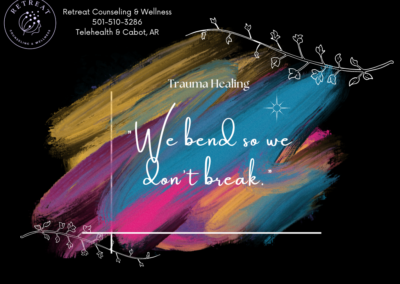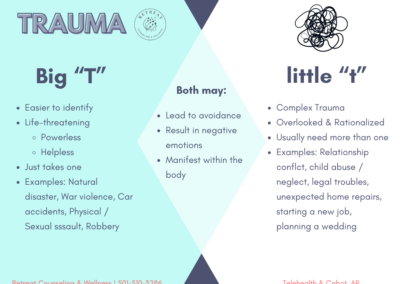As a licensed counselor, I have found that learning about trauma and the brain is one of the most eye-opening experiences for people as they begin their healing journey. That said, before I start this article, I would like to pay tribute to the leading professionals in the field who have given me the opportunity to learn about trauma and develop the ability to help people, such as yourself, integrate their trauma so that it no longer defines them. These include Bessel van der Kolk, Janina Fisher, and Deb Dana. Their books and trainings have made it possible for my to share valuable content with you in all areas of my work with trauma.
Understanding Trauma and The Brain: Why It Can Be So Hard To Remember
When we experience a traumatic event, whether it’s a major accident, abuse, neglect, or even a stressful event like surgery, it can be hard to “move on” or feel normal again. But why is that? Well, trauma is not a one-and-done event. It leaves us with symptoms, like anxiety, depression, or panic attacks, rather than clear memories of what happened. Let’s explore how trauma affects the brain and why it’s so much more than just “what we remember.”
What Makes an Event Traumatic?
Trauma isn’t just about how big or scary an event is. What makes something traumatic is how our brain and body react. Sometimes, it’s not even about the event itself, but how we process it.
For example, imagine a 5-year-old child left alone for a few hours. While an adult might be fine in that situation, for a young child, that could be deeply traumatic. The key is how the brain reacts to the stress—it’s not about the event but how it affects the person in the moment.
The Legacy of Trauma: How the Brain Responds
Many people who have been through trauma don’t have clear memories of the event. Instead, they have symptoms—like depression, anxiety, or a constant sense of feeling on edge or uneasy. This is because trauma isn’t remembered in just one place in the brain—it’s scattered throughout, affecting different parts of us in unique ways.
For example, trauma can show up as:
-
Depression: A sense of feeling “stuck” or disconnected.
-
Irritability: A need to push others away.
-
Numbing: Feeling emotionally flat or disconnected from life.
-
Loss of interest: Not caring about things that used to matter.
- Substance (Ab)use: A need forget about the emotional pain or silence racing thoughts.
- Anxiety: A desire to escape vulnerability.
These responses are not a one-size-fits all. Over time, these reactions become the legacy of trauma—ongoing symptoms that continue to affect how you live, even long after the event itself. Your “legacy” will depend on what it is that you needed when the trauma event happened. These responses are how the body learned to survive. It’s your brain’s way of coping with overwhelming situations.
Why Don’t Trauma Survivors Just Have Memories?
You might be wondering: if the event was so important and impactful, why don’t I remember it clearly? The brain’s structure plays a big role here.
The brain doesn’t store memories in one single place. Instead, it uses different areas of the brain to process and store different types of memories. The problem is that during a traumatic event, parts of the brain that would normally help us form a coherent memory shut down in response to stress.
The Brain’s Stress Response: Why We Can’t Think Clearly During Trauma
When we experience trauma and the brain senses danger, it reacts quickly to protect us—this is known as the “fight, flight, freeze” response. This is controlled by the amygdala, the brain’s emotional center, which acts like a smoke detector, sensing danger before we consciously realize it.
However, in a high-stress situation, the prefrontal cortex (PFC), which is responsible for reasoning and memory, gets “shut off.” This helps us react faster, but it means we don’t have a clear, organized memory of the event. Instead, we remember feelings—like fear, panic, or pain—rather than a clear sequence of what happened.
This is why trauma can feel “fuzzy” or fragmented. You might remember flashes of the event, but not the whole story. It’s like having a puzzle with missing pieces.
Trauma and The Amygdala: A Sensitive Smoke Detector
The amygdala not only helps us react quickly in dangerous situations, but it also stores emotional memories. These are the raw, unprocessed feelings that remain after a traumatic event, and they are often what we carry with us.
After trauma, the amygdala becomes overly sensitive. This means it can pick up even the smallest reminders of the trauma—like a sound, smell, or situation—and trigger an emotional reaction. This is why someone might suddenly feel anxious or panicked without understanding why. It’s because the brain is still reacting to reminders of the past.
Why Trauma Symptoms Are So Common
It’s important to understand that trauma doesn’t just live in our memories—it lives in our bodies too. The physical symptoms of trauma, like anxiety, pain, or numbness, are often the body’s way of protecting us. These symptoms are reminders of how we adapted to survive.
For example:
-
Numbness might have helped you block out overwhelming feelings.
-
Depression could have felt like a protective cocoon, keeping you distant from painful memories.
-
Irritability might have pushed others away to prevent vulnerability.
These survival mechanisms are trauma’s legacy—the ways the brain and body learned to cope. But, unfortunately, they can keep us stuck in patterns of emotional pain.
What Happens Next? Healing from Trauma
Healing from trauma means addressing both the emotional memory stored in the amygdala and the logical memory that’s stored in other parts of the brain. This is why counseling is so important—it helps bring understanding to those fragmented memories and emotional responses.
With the right help, trauma survivors can learn how to process their emotional memories, connect with their experience, and ultimately heal from the legacy that trauma leaves behind.
Trauma and the Brain: Moving Forward with Healing
If you or someone you know is struggling with trauma symptoms, counseling may be a helpful avenue to beginning to truly process those symptoms rather than continuing to relive them over and over. Through a combination of techniques—for example, trauma-focused therapy, EMDR (Eye Movement Desensitization and Reprocessing), and/or mindfulness—it’s possible to integrate and heal from trauma’s impact.
Understanding trauma and the brain is one of the essential first steps in the healing journey. When we work together, these concepts are broken down in an easy-to-understand manner. We move forward with a carefully conceptualized approach to address the legacy of your trauma and help you find peace and balance again.
Contact Me Today
If you’re ready to explore how trauma might be affecting your life, you may schedule a phone consultation or your first appointment through the client portal. I offer in-person and virtual sessions to support clients in Cabot, AR and the surrounding areas.
References:
Fisher, J. (n.d.). Complex Trauma Certification Training Course. Pesi. Module 1: Trauma and the Body.




